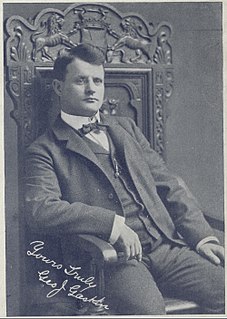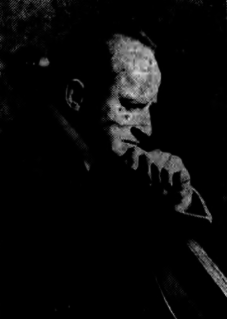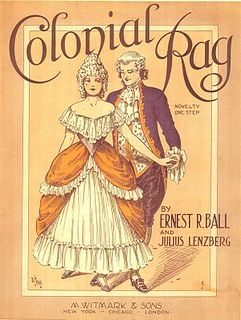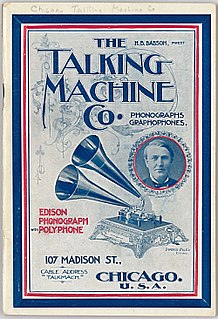Events in the year 1893 in music.

Benjamin Robertson "Ben" Harney was an American songwriter, entertainer, and pioneer of ragtime music. His 1895 composition "You've Been a Good Old Wagon but You Done Broke Down" is regarded as among the earliest ragtime composition, but while he promoted himself as the inventor of ragtime, he "almost certainly was not." Though now probably more associated with Scott Joplin, in 1924 The New York Times wrote that Ben Harney "probably did more to popularize ragtime than any other person." Time Magazine termed him "Ragtime's Father" in 1938.
Edison Records was one of the early record labels that pioneered sound recording and reproduction, and was an important player in the early recording industry.
Discography is the study and cataloging of published sound recordings, often by specified artists or within identified music genres. The exact information included varies depending on the type and scope of the discography, but a discography entry for a specific recording will often list such details as the names of the artists involved, the time and place of the recording, the title of the piece performed, release dates, chart positions, and sales figures.

Arthur Francis Collins was an American baritone who was one of the most prolific and beloved of pioneer recording artists, regarded in his day as "King of the Ragtime Singers".

George J. Gaskin was one of the most popular singers the United States in the 1890s and an early American recording artist.

Daniel William Quinn was one of the first American singers to become popular in the new medium of recorded music. Quinn was a very successful recording artist whose career spanned from 1892 to 1918. Quinn recorded many of his hits in the legendary Tin Pan Alley of New York City.

Joseph Samuels was an American musician and bandleader, who is today virtually only known through his recordings.

The "Black and White Rag" is a 1908 ragtime composition by George Botsford.

Fred Van Eps was an American banjoist and banjo maker. The "Van Eps Recording Banjo" was a well-known model until 1930. He was the father of jazz guitarist George Van Eps.
The Unique Quartette was a black vocal quartet in New York City. Founded in the mid-1880s by Joseph Moore, they are best known for a handful of wax cylinder recordings made in the first half of the 1890s. They are the earliest known black vocal group to have been commercially recorded, with their first recordings made in December 1890 for the New York Phonograph Company.

John W. Myers, who was usually credited as J. W. Myers, was a Welsh-born baritone singer, who recorded widely in the United States between the early 1890s and early 1917. His recordings, including "Two Little Girls in Blue" (1893), "The Sidewalks of New York" (1895), "Just Tell Them That You Saw Me" (1895), "When You Were Sweet Sixteen" (1901), "On a Sunday Afternoon" (1902), "Way Down In Old Indiana" (1902), and "In the Good Old Summer Time" (1902), were among the most popular of the period.

Hans Kronold was a Jewish-born Polish cellist, composer, educator, and a member of symphony orchestras of New York and Boston. He was the first musician to make cello recordings on phonograph cylinders for Gianni Bettini.

Julius Lenzberg was a German-American composer of ragtime and jazz. He recorded a substantial number of jazz pieces with orchestra between 1919 and 1922, in addition to ragtime music such as his popular Hungarian Rag of 1913.

The United States Phonograph Company was a manufacturer of cylinder phonograph records and supplies in the 1890s. It was formed in the Spring of 1893 by Victor Emerson, manager of the New Jersey Phonograph Company. Simon S. Ott and George E. Tewkesbury, heads of the Kansas Phonograph Company and inventors of an automatic phonograph joined later. It was based in Newark, New Jersey. After the collapse of the North American Phonograph Company in August 1894, the United States Phonograph Company became one of the industry's largest suppliers of records, competing mostly with the Columbia Phonograph Company who had joined with the American Graphophone Company to manufacture graphophones, blank wax cylinders, and original and duplicate records. The USPC manufactured duplicates as well, which allowed their recording program to reach the scale of competing with Columbia's. Their central location and proximity to New York allowed them to record the most popular artists of the 1890s, including George J. Gaskin, Dan W. Quinn, Len Spencer, Russell Hunting and Issler's Orchestra. Emerson left the company to lead Columbia's recording department around the summer of 1896. In 1897 the USPC worked with Edison's National Phonograph Company to retrofit phonographs with spring motors invented by Frank Capps. The convenience and cost savings of spring-motor phonographs like these helped shift the phonograph from a public entertainment to a consumer good. In October 1899 the company was prohibited by court order from manufacturing duplicate records, and they began supplying original records for the National Phonograph Company[7][7][6][6][5][5]. The later U.S. Phonograph Company of Cleveland Ohio is unrelated.

The Chicago Talking Machine Company was a manufacturer and dealer of phonographs, phonograph accessories, and phonograph records from 1893 until 1906, and a major wholesaler of Victor Talking Machine Company products between 1906 and at least 1928.

Walcutt and Leeds was a manufacturer and dealer of cylinder records and supplies in the 1890s. It was formed in February 1896 by Cleveland Walcutt and Edward F. Leeds at 53 E. 11th St. in New York City. Walcutt and Leeds had previously been partners in the firm Walcutt, Miller & Co., which had purchased the record manufacturing plant of the North American Phonograph Company at 120 E. 14th St. in New York City, including a large stock of records, blanks, and recording phonographs.

Roger Harding was an Irish-American singer, composer and music publisher active in the United States from 1890 to 1901.

Frederick E. Hylands was an American pianist, composer and publisher active 1887-1913.















